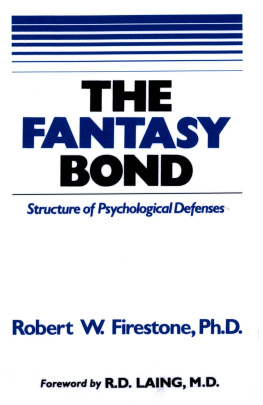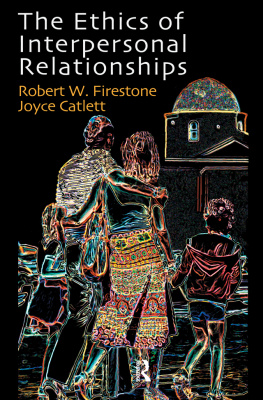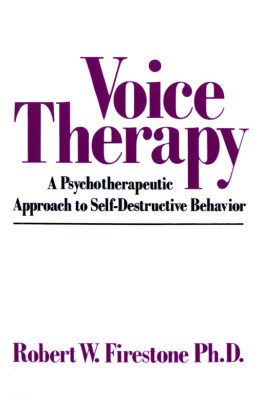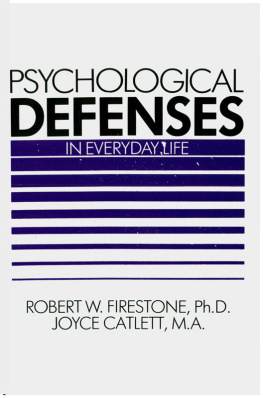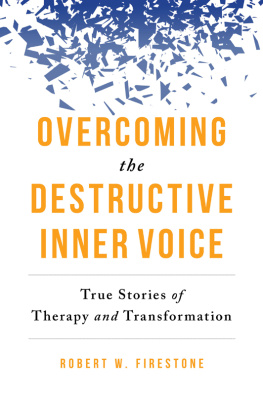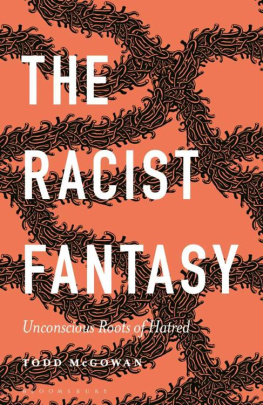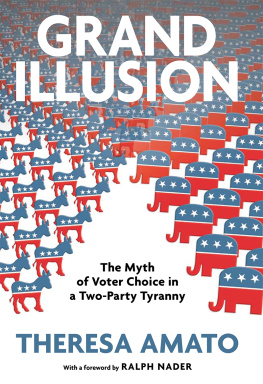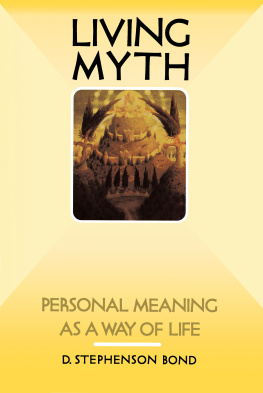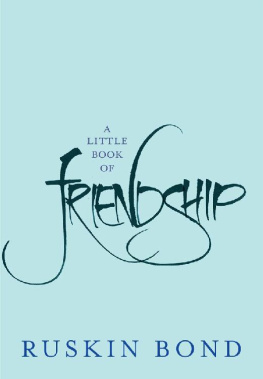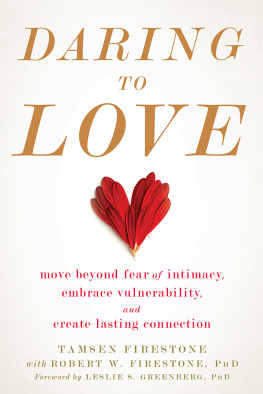
ISBN: 9780967668451
Published by The Glendon Association
All rights reserved. No part of this work may be reproduced or utilized in any form without permission in writing from the publisher.
Library of Congress Cataloging in Publication Data
Firestone, Robert W.
The fantasy bond.
DEDICATION
To my patients, friends, and associates who contributed their honesty and openness by sharing their experience and personal struggle and actively participating in my explorations and conclusions.
CONTENTS
Index
ACKNOWLEDGMENTS
The author would like to express his appreciation to Joyce Catlett, M.A., associate and collaborator, for her major contribution to the organization and writing of this book. I am also grateful to Tamsen Firestone and Barry Langberg for their continuing critique and evaluation of the manuscript; to Cecilia Hunt for her initial editing and suggestions; and to Anne Baker and Eileen Tobe for their help in completing the final draft.
I would like to extend my special thanks to Dr. Stuart Boyd for his commentary on the psychotherapeutic community and the concepts that evolved from that setting, and to Dr. Richard Seiden for his interest and criticism of the manuscript. I would also like to express my admiration and appreciation to R. D. Laing for his moral courage in exposing the essential destructiveness in the conventional family unit and perceiving the validity of human suffering and resulting psychopathology emanating from that source.
The names, places, and other identifying facts contained herein have been fictionalized and no similarity to any persons, living or dead, is intended.
FOREWORD
I am honoured to have been invited to write the foreword to Bob Firestones book, The Fantasy Bond.
Dr. Firestone offers vivid and accurate description of a sort of bondage shared by millions of men and women throughout the western world. After living together and being in love for awhile, they begin to feel tied to each other, bound to each other, connected to each other. They are not, except in fantasy. Moreover, they may even go on to feel that they are not separate individual human beings, each with their own centers, points of view, destiny, each with their own deaths awaiting each, separately, but they, we, two, have become one. Who could ask for anything more? Alas, this also is fantasy. However intimately at one we are, we could not feel at one, as one, unless we are not one. Only two or more can be at one. This at-one-ment is the very opposite of the fantasy bond as described and depicted by Firestone. The fantasy bond is an illusion, a fantasy; even more, it is virtually and literally, a mirage.
There are oases. They are to be found, sometimes, by some of us. But we shall never find an oasis in the spell of the mirage.
The descriptive accounts in Firestones book remind me so much of similar ones from my own professional practice, let alone from my own personal life.
They both said they loved each other but were extremely nasty to each other. Each admitted they were nasty and each accused the other of being nasty. Both were right. Neither could stop it. Thats why they came to see me.
They had been married for three years. No children by mutual agreement.
They had begun as appreciative, satisfied, loving lovers. They were almost one, but this ended almost as soon as they married.
Sex quickly turned into a nightmare for both of them. Its as though, she explained, we are playing a game of football. Hes taking a penalty goal and Im the goalkeeper. Yes, he added, and she never told me the score for three years.
They both agreed thoroughly with the simile metaphor analogy, and both took equal responsibility for embracing it. Among other things, I invited them to imagine a mutual nice image of love making, onto their act of love, but they could not or would not and did not try it out, however deliberately.
They left after three months, in much the same interlock. As Firestone says, they tell themselves they want out of it, but, in fact, they do not dis-interlock.
Why? They are both engulfed by their own miserable mirage of intimacy. They are desperately estranged from each other yet they are terrified to realize that they are simply separate. They could not come together because they could not bear to be apart. They had both become a part of the other. She had become his frustrating mother, who always kept him out, and he had become her impinging, penetrating, raping parents, always trying to get in.
Both felt completely at home. Both loved their home, the typical beautiful home for a miserable mirage between two beautiful people who are ugly to each other.
Firestones explanation for this state of affairs is that those of us who enslave ourselves in the bondage of the mirage of love are parched for lack of love, and so fearful of giving and getting the love we lack, so terrified of the real thing, that we create our own hell and whine and complain that it keeps on not being the heaven we say we want and want to believe we are in.
For those who are beset by this romantic fantasy illusion mirage, the prime generating factor behind this, Firestone proposes, is that our parentsmothers more primitively than fathers, but fathers as welldid not love us, but pretended to themselves and to us that they did. They generally mistake emotional hunger for love.
In effect, they hate us in practice and love us in theory and induce us to believe them when they define their hate as love. The consequent mystification, confusion and conflict continue to devastate marriages, families, and each generation of children.
Firestone goes on to offer various therapeutic methods in response to this situation. In particular voice therapy, a method whereby people get the incorporated hating parent out of their system by dramatizing their parents hateful hating attacks on them; attacks which hurt at the time, but went further, the hurt did not mend; the wound did not heal; these hateful hating attacks did permanent damage. They did injury to our hearts and souls, the spirit was broken. Procedures were developed to externalize the patients self-attacks, clearly demonstrating their relationship to parental attitudes.
Firestones therapy is based on lovegenuine love in action, compassionate, forebearing, non-intrusive, skillful in the nitty gritty of psychotherapeutic professional practice.
My own personal experiences of developing a fantasy bond are among the most dreary, boring, agonizing, debilitating and physically dangerous times Ive ever lived through. I am out of it now, I hope. Apart from infancy, this kind of bonding happened to me three times. Once in my twenties for about three years. Once in my thirties for about three months. And once in my forties.
Out of my own experience and those of the many sufferers from the varieties of its miserable consequences, I offer this Knot, or set of traps. I hope it is both didactic and entertaining.
- Do you love me?
- Then believe me.
- Believe me
- You dont love me.
- You dont love anyone
- You are incapable of love.
- No one loves you
- No one could love you
- Except me.
- I am the only one who loves you
You dont love me
You dont love anyone
No one loves you
No one can love you
- But dont believe me
Because I say so
or because I love you
Although
believe me
its only because I love you
that I say so
Search yourself
Look into the mirror and see for yourself
Next page
